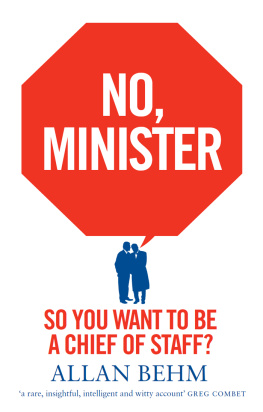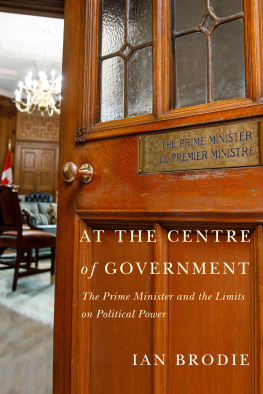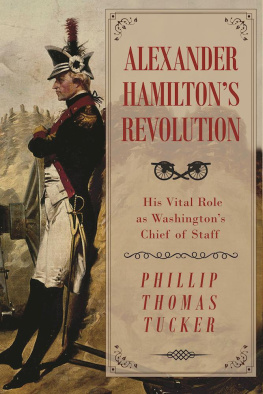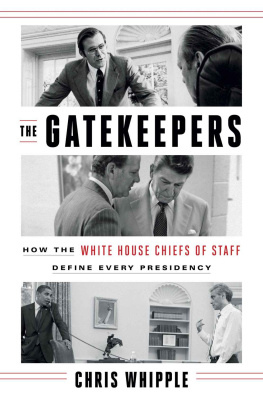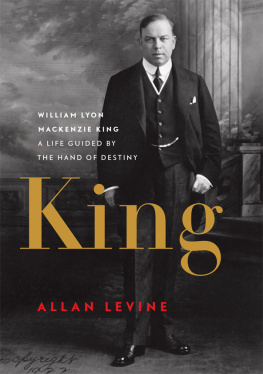MELBOURNE UNIVERSITY PRESS
An imprint of Melbourne University Publishing Limited
1115 Argyle Place South, Carlton, Victoria 3053, Australia
www.mup.com.au
First published 2015
Text Allan J Behm, 2015
Design and typography Melbourne University Publishing Limited, 2015
This book is copyright. Apart from any use permitted under the Copyright Act 1968 and subsequent amendments, no part may be reproduced, stored in a retrieval system or transmitted by any means or process whatsoever without the prior written permission of the publishers.
Every attempt has been made to locate the copyright holders for material quoted in this book. Any person or organisation that may have been overlooked or misattributed may contact the publisher.
Cover design by Design by Committee
Typeset in Bembo 11.5/14.5 pt by Cannon Typesetting
Printed in Australia by McPherson Printing Group
National Library of Australia Cataloguing-in-Publication entry
Behm, Allan, 1945 author.
No, minister: so you want to be a chief of staff?/Allan Behm.
9780522868142 (paperback)
9780522868159 (ebook)
Civil serviceAustraliaOfficials and employees.
AustraliaPolitics and government.
351.94
Foreword
A LLAN BEHMmy former chief of staffhelped me survive the grief and hard grind of the RuddGillard leadership battles, the carbon tax fight, policy conflicts, indigestible Cabinet papers, defence contracting imbroglios and recurrent political crises. In these pages I have learned even more of the support he provided, both professionally and as a friend. The book is a rare, insightful, intelligent and witty account of the inner workings of politics and public policymaking.
The lives of Australian citizens are influenced by the way in which our democratic system of government makes decisions and laws. Myriad forces attempt to buffet and sway the political processlobbyists, rent-seeking businesses, shysters, tax dodgers, state and local authorities, international corporations, foreign powers, political donors, churches, unions and welfare groups, internet campaigners, the military, intelligence agencies, sporting groups, returned services organisationsyou name it. All of them seek an audience with the minister, to persuade him or her of their compelling case to change public policy.
As a minister, I was quite often astounded by the audacity of the claims. Large global companies were at times outrageous, patronising while simultaneously demanding money. One international coal-mining executive, while toying with immaculately jewelled cufflinks, contemptuously dismissed the governments right to legislate a price for carbon pollution while conceding that his company had been factoring a carbon price into investment decisions for years.
As chief of staff, Allan Behm absorbed much of the lobbying assault on my behalf, an assault that became ferocious during the development of the controversial carbon pricing legislation. The manner in which he managed it, described in No, Minister, is a guide for any aspirant to public office.
With a distinguished public service record, Allan was also invaluable in navigating the complex relationships between executive government, government departments and senior public servants. He selected and mentored my staff, oversaw difficult policy judgements, and coordinated my relationships with other ministerial offices, the Greens, independents, the Opposition and backbench MPs.
As will be seen in these pages, however, Allan Behms role in my office involved a lot more than political or staff management. It reflected Allan himselfan advocate for holding true to good values, a person sensitive to others, the provider of intelligent and mature counsel, a friend with great humour. When in the grip of the crisis over the Home Insulation Program, with staff working very long days on numerous weekends in an office without air-conditioning or fresh air, Allan correctly assessed that his best contribution would be to sustain everyone with good food, encouragement, and, at the appropriate moment, an alcoholic elixir. His humanity was the fulcrum of successful crisis management.
As part of contemporary political history, this book provides an alternative insight into the machinations of the Rudd and Gillard governments. But it is far more than that. It is a window into the way in which governments work, the experiences of the people on the inside, and a guide to how good government should work. The book will become an essential reference for anyone contemplating work within a ministerial office, especially in the little-understood and complex role of a chief of staff, which is herein, for the first time in modern Australian politics, laid bare in a beautifully crafted and engaging personal account. Its a gem.
Greg Combet, December 2014
Preface
W HY WOULD a survivor of the shadowy confines of a ministers office want to write a book about how things are done in the stale air and poisonous politics of the Commonwealth parliament? The answer does not lie in a wish to lament the manifest inefficiency and introspective purposelessness of the nations current political processes. Nor does it lie in a desire to apportion blame for the lack of discipline and focus that characterised the Rudd and Gillard governments, and increasingly distinguishes the Abbott government. And it certainly does not lie in any need to mourn the destruction of legislative successes, such as the Gillard governments climate change package.
The answer actually lies in my strong conviction that the nations political system can be overhauled and improved by re-engineering the way that politics and public policy are brought together to enhance the lives of our citizens and the wellbeing of our nation. An obvious starting point is to examine one of the pivotal but largely invisible functions in the management of our parliamentary politicsthe ministers chief of staffand to identify means by which performance might be significantly improved.
Like many Australians, I have long entertained a malaise about the way our political business is transacted at the national level. As a senior public servant, I saw only too often how political pragmatism could trump policy principle. And as a voter, albeit in one of the most privileged cities in the world, I was constantly disappointed by the triumph of contrived political spin over a substantive discussion of the issues that confronted us as a nation, and the options we might have had to create a more prosperous and resilient community.
But like most other concerned citizens, I had no clear idea of how to deal with this malaise. Following my departure from the public service in 2001, I maintained a steady stream of academic papers, media commentary and Senate Committee inquiry submissions on national security issues in the vain hope that I could influence the quality of the public policy outcomes by contributing to the quality of the inputs. Many other prophets have cried in the wilderness. My contributions, nicely crafted and well intentioned, disappeared into the political morass. The solution to my problem came from an unexpected quarter.
When Senator John Faulkner, then the Minister for Defence in the first Rudd government, contacted me on a Sunday afternoon in July 2009 to organise a meeting between us, I imagined that he wanted to discuss the emerging tragedy in Afghanistana matter on which I had been providing some rather gloomy commentary in the media. So I was surprised when he arrived at my home in Canberra late that evening to suggest that I join his junior minister, Greg Combet, as chief of staff.


